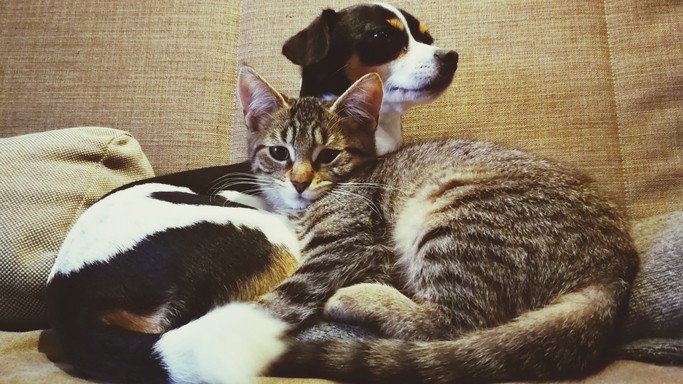Can cat fleas live on dogs?
How much do you know about fleas? Can cat fleas live on dogs? Let’s take a look...

If you own cats and dogs, you may well have wondered to yourself “Can cat fleas live on dogs?”. You might also find yourself searching for the best flea treatments for cats or the best flea treatments for dogs. But to add even more complications, there is not just one kind of flea. Common fleas include the cat flea, dog flea, rabbit flea, and hedgehog flea. So, if you spot some crawly critters in your dog’s fur, you’d probably assume they were dog fleas, right?
Well, as it happens, cat fleas can live on both cats and dogs and are far more common than dog fleas. So, if your dog has fleas, your cat might be the source!
- Dog fleas vs cat fleas: What's the difference?
- How to give a dog a flea bath
- How do cats get fleas?
Can cats get fleas from dogs?
Although there are specific cat and dog fleas, they’re not that fussy when it comes to who they parasitise! So, your dog could quite easily become infested with cat fleas or dog fleas and then pass them on to your cat. The most common flea is the cat flea, so it’s much more likely that your dog would pick up cat fleas than dog fleas, but because fleas are not host-specific, they could become infested with any type.
The fact that fleas don’t stick to one species makes it all the more important that you treat your pets regularly with an anti-flea product. However, it’s also important to spray your home with a household flea killer if you think they might have brought fleas into the house. These are some of the best flea collars for dogs and the best flea collars for cats. but there are other treatments available. If you don’t think your cat or dog would tolerate wearing a flea collar, speak to your veterinarian about options like spot-ons, sprays, and tablets.
Can dog and cat fleas live on humans?
Thankfully, fleas don’t live on humans! This is because we don’t have enough hair! Since they don’t live on humans, you might assume you’re safe from flea bites. But do fleas bite humans? Well, sadly, even though fleas can’t infest humans, that doesn’t mean they don’t bite. Many fleas will take the opportunity to feed from humans if they’re nearby by jumping on us, feeding from our blood, then jumping back to their host or the environment.
My dog and cat have fleas; what do I do?
If your cat and dog have fleas, you might wonder what to do, especially if you’ve been pretty good at sticking to their flea treatment regimes. If you feel like you’re doing everything right, you might feel frustrated and wonder, ‘Why is my flea treatment not working?’ In these situations, it’s most important to make sure you treat every one of your pets with a veterinary-licensed flea treatment at the same time.
Alongside this, you should hot-wash any removable bedding and soft furnishings where your pet sleeps and consider using a household flea spray. By treating all hosts and the environment at the same time, you’ll ensure that the fleas have nowhere to hide! Once you’ve dealt with fleas in the home once, it’s bound to be something you never want to experience again. So, here are six ways to prevent fleas!
Get the best advice, tips and top tech for your beloved Pets
- What’s the safest flea treatment for cats? Our vet answers
- What’s the safest flea treatment for dogs? A vet's guide
- How to soothe flea bites on dogs
What will kill fleas instantly?
If you notice fleas on your pet, it’s natural to want them gone straight away! Different flea treatments work in different ways. Some will kill fleas as they feed, while others will inhibit their life cycle. Other flea preventative treatments will also repel live fleas, helping to keep your four-legged friend safe from infestation. Treatments are available as collars, spot-on treatments, sprays, and tablets.
So, how do you know which flea treatment is the most appropriate treatment for your cat or dog? Well, it’s best to speak to a veterinarian at your local veterinary clinic for advice on which product will best suit you and your furry family.
Summary
Finding fleas on your pet or in the home can be distressing and stressful, especially if you regularly use flea treatment on your pets. If you’re finding these pesky parasites hard to eradicate, make sure you’re using a veterinary-approved product, and treating all pets in the household. It would be best if you also used a household flea spray and hoover throughout your home, as well as hot-washing everything you can.
However, if you’re still having trouble, speak to your veterinarian. They’ll be able to help find the source of the fleas as well as provide you with the tools and treatments you need to get your pet’s fleas under control for good.
Dr Hannah Godfrey is a small animal vet who graduated from the Royal Veterinary College in 2011 and began work straight away at a busy mixed practice. Initially, she treated all species, but focussed on small animals from 2014. She has a passion for soft tissue surgery, ultrasound, and canine and feline dentistry, having completed additional training in these areas.

